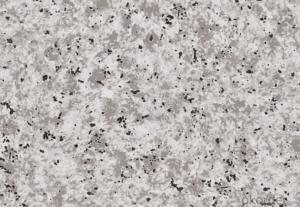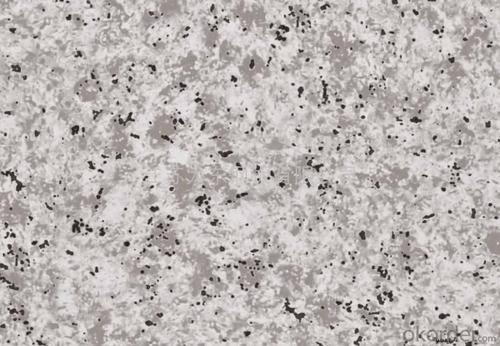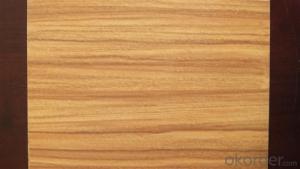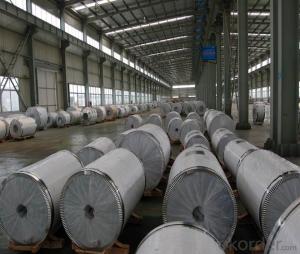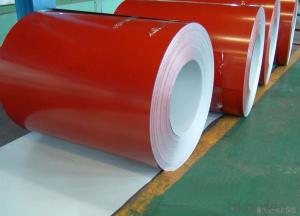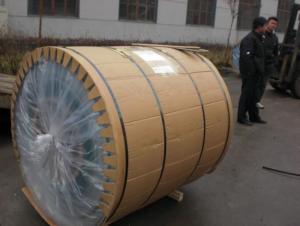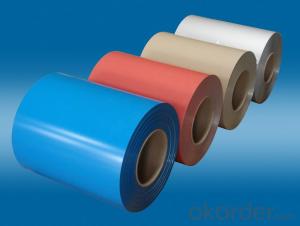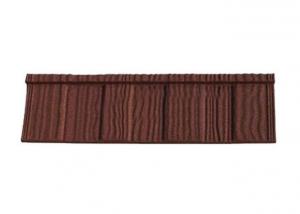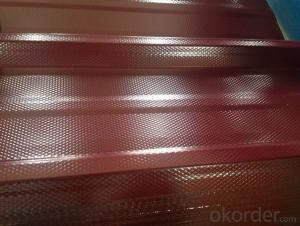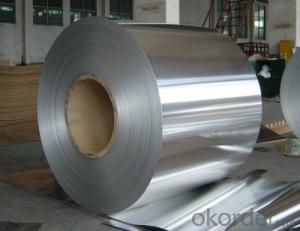Stone Coated Aluminum Roof Coil
- Loading Port:
- China Main Port
- Payment Terms:
- TT OR LC
- Min Order Qty:
- -
- Supply Capability:
- -
OKorder Service Pledge
OKorder Financial Service
You Might Also Like
Product Description:
1 Specifications of PE Coated Aluminum Coil/Sheet
Alloy | AA1050,AA1060, AA1070, AA1100, AA3003, AA3004, AA3005, AA3105, AA5005, AA5052, AA5754, AA5083, AA8011 |
Temper: | H12, H14, H16, H18, H22, H24, H26, H32,HO, F |
Thickness: | 0.10-4.0mm |
Width: | 10mm- 2000mm |
Coating | PE(Polyester) |
Painting Thickness | Standard 16-25 microns, max 40 microns |
Color | Acording to Ral colors or customer’s samples |
Standard: | GB/T17748-1999, ASTM, ISO, EU standard |
Special Specification is available on customer’s requirement | |
Paint Material:PPGI,BECKER, NIPPON.
PE(polyester) Coating
PVDF
2 Usage/Applications of PE Coated Aluminum Coil/Sheet
Our company's PE Coated Aluminum Coil/Sheet have been widely used in the fields of construction and decoration(garage doors, ceiling etc.), electronic appliances, lighting decoration, air-condition air pipe, sanwich panels and drainage, etc.
- Q: I am sanding tool marks out of aluminum rims and plan on polishing them. Any help to make sanding them easier would be welcome.
- Sanding Aluminum Wheels
- Q: This question asks for a comparison between aluminum coil and iron coil, highlighting their distinct properties and uses.
- <p>Aluminum coil and iron coil differ in several aspects. Aluminum coil is lightweight, corrosion-resistant, and has excellent electrical and thermal conductivity, making it ideal for electrical wiring, heat sinks, and food packaging. Iron coil, on the other hand, is heavier, stronger, and more durable, commonly used in construction, automotive, and heavy machinery due to its high tensile strength. Iron also has magnetic properties, useful in applications like transformers and electromagnets. While aluminum is non-magnetic, it is more cost-effective and has better recyclability compared to iron.</p>
- Q: i have about 100lbs of aluminum blocks and scrap.
- WOW.......they must be worth sum money. Lucky you!!!!!!
- Q: This question asks for methods to protect aluminum coils from damage during storage and transportation.
- <p>To prevent damage to your aluminum coil during storage or transportation, follow these guidelines: Store the coils in a dry and clean environment to prevent moisture and dirt accumulation. Ensure that the storage area is well-ventilated to avoid condensation. Use appropriate padding or separators between coils to prevent scratching or denting. Handle the coils with care, using proper lifting equipment to avoid dropping or mishandling. Secure the coils during transportation to prevent movement that could lead to damage. Keep the coils away from corrosive substances and extreme temperatures. Regularly inspect the coils for any signs of damage and address any issues promptly.</p>
- Q: This question asks for methods to assess the quality of aluminum coils.
- <p>To determine the quality of aluminum coils, consider several factors: purity and alloy composition, which affects strength and corrosion resistance; surface condition, checking for scratches, dents, or impurities that can affect performance; mechanical properties like tensile strength and elongation; and dimensional accuracy, including thickness, width, and straightness. Conduct tests such as hardness tests, tensile tests, and corrosion resistance tests. Visual inspection and using measuring tools for dimensional checks are also crucial. Compliance with industry standards and certifications from recognized bodies can also indicate quality.</p>
- Q: Are there any limitations to the minimum coil length of aluminum coils?
- Yes, there are limitations to the minimum coil length of aluminum coils. The minimum coil length is determined by various factors such as the manufacturing process, equipment capabilities, and the intended use of the coils. One limitation is the size and capacity of the manufacturing equipment. Most coil production lines have a minimum length requirement to ensure efficient operation and to prevent damage to the coils during the manufacturing process. If the coil is too short, it may not be properly processed or handled by the equipment, leading to production issues or product defects. Another limitation is the intended use of the coils. Certain applications may require a minimum coil length to meet specific requirements or to ensure optimal performance. For example, in industries such as construction or automotive, coils are often used to make components or structures that have specific length requirements. In such cases, the minimum coil length is determined by the specifications of the end product. Additionally, handling and transportation considerations also play a role in determining the minimum coil length. Coils that are too short may be more difficult to handle, transport, or store, making them less practical or cost-effective. In summary, the minimum coil length of aluminum coils is subject to limitations imposed by manufacturing equipment capabilities, intended use, and practicality in terms of handling and transportation. These limitations ensure efficient production processes, adherence to product specifications, and practicality in the overall supply chain.
- Q: should i have a paper between aluminum siding and the wood
- Aluminum siding can be vented with round pop-in perforated vent plugs, these are very easy to install. I would really like to know how do you know there is condensation behind your siding?
- Q: Are aluminum coils resistant to fire?
- Aluminum coils are widely recognized as being fire-resistant. They possess a high melting point of 660 degrees Celsius, which is considerably higher than the typical temperature of most household fires. Consequently, aluminum coils are a favored choice for diverse applications requiring fire resistance, including the construction of buildings, electrical systems, and automotive components. Moreover, aluminum exhibits low flammability and does not emit toxic fumes when exposed to fire, further heightening its fire-resistant characteristics. Nonetheless, it is vital to acknowledge that the fire resistance of aluminum coils may vary depending on the specific alloy employed and the thickness of the coil. Hence, it is always advisable to seek advice from experts or adhere to industry standards to guarantee the implementation of appropriate fire safety precautions.
- Q: Are aluminum coils suitable for outdoor applications?
- Yes, aluminum coils are suitable for outdoor applications. Aluminum is known for its excellent corrosion resistance, making it a popular choice for outdoor use. It is not prone to rust or deterioration when exposed to moisture, sunlight, or harsh weather conditions. Additionally, aluminum coils are lightweight, durable, and have a high strength-to-weight ratio, making them ideal for various outdoor applications such as roofing, gutters, air conditioning systems, and outdoor furniture. Moreover, aluminum is a highly recyclable material, making it an environmentally-friendly choice for outdoor projects. Overall, aluminum coils are a reliable and practical option for outdoor applications.
- Q: What are the common safety precautions when working with aluminum coils?
- To ensure the safety of individuals and prevent accidents, it is crucial to follow several safety precautions when handling aluminum coils. Here are some commonly recommended safety measures: 1. Personal Protective Equipment (PPE): It is essential to wear appropriate safety gear, such as safety goggles, gloves, and aprons, while working with aluminum coils. This protective equipment is necessary to safeguard against potential injuries from sharp edges, cuts, or burns. 2. Proper Handling Techniques: To avoid strain or injury, it is important to use proper lifting techniques while handling aluminum coils. Since these coils can be heavy, lifting with your legs instead of your back and using lifting aids or equipment, if required, is crucial. 3. Secure Storage: To prevent any accidents, it is vital to securely store aluminum coils. Avoid stacking them too high to prevent them from falling or rolling over and causing injuries. 4. Adequate Ventilation: To prevent the buildup of fumes or dust particles, it is important to ensure that the work area has proper ventilation. Aluminum coils may release harmful particles or gases during cutting or processing, making proper ventilation necessary for maintaining a safe working environment. 5. Fire Safety: Due to the high flammability of aluminum, it is extremely important to avoid sparks or open flames near aluminum coils. Using non-sparking tools and refraining from smoking or using flammable materials in the vicinity is crucial. 6. Sharp Edges: It is important to be cautious of sharp edges on aluminum coils as they can cause cuts or lacerations. Handling coils with care and using appropriate tools can help mitigate the risk of injury. 7. Training and Safety Guidelines: All personnel working with aluminum coils should receive proper training on handling procedures and safety guidelines. This includes knowing how to correctly use equipment, understanding emergency procedures, and being aware of any specific hazards associated with aluminum coil handling. 8. Regular Maintenance: Regularly maintaining equipment and tools is necessary to ensure they are in good working condition. This involves inspecting and repairing any damaged or worn-out parts that could pose a safety risk. 9. First Aid and Emergency Response: Keeping a well-equipped first aid kit nearby and ensuring that employees are aware of its location is important. Additionally, establishing clear emergency response protocols and training employees on what to do in case of an accident or injury is crucial. By following these common safety precautions, individuals can minimize the risks associated with working with aluminum coils and create a safer working environment.
Send your message to us
Stone Coated Aluminum Roof Coil
- Loading Port:
- China Main Port
- Payment Terms:
- TT OR LC
- Min Order Qty:
- -
- Supply Capability:
- -
OKorder Service Pledge
OKorder Financial Service
Similar products
Hot products
Hot Searches
Related keywords
